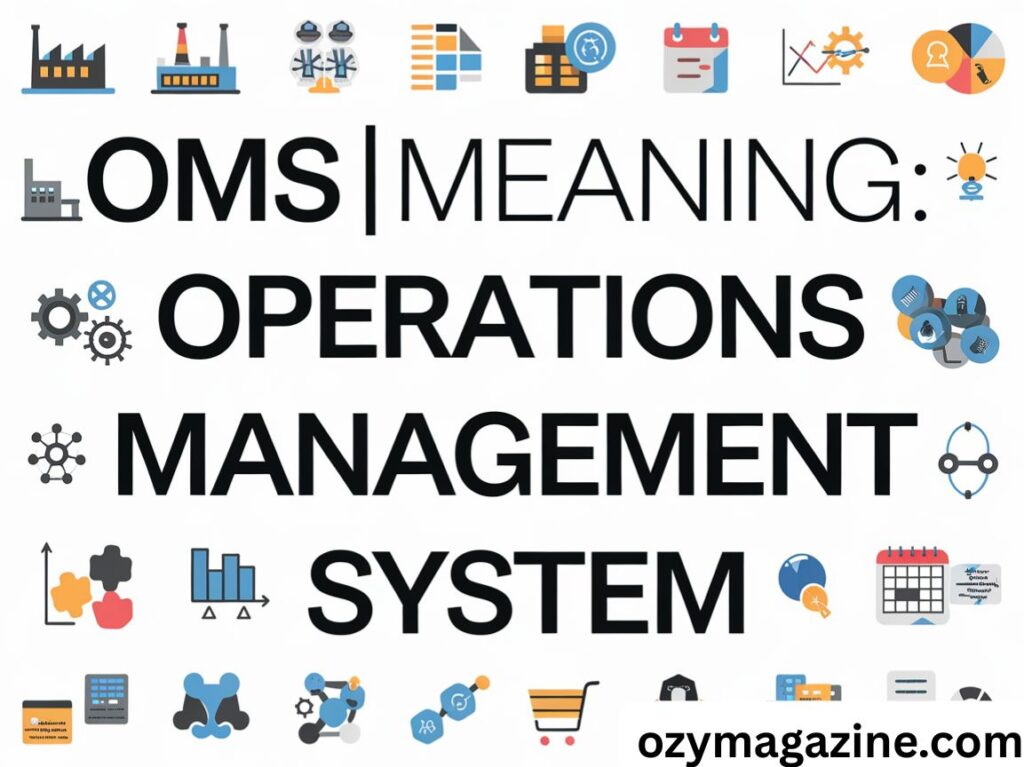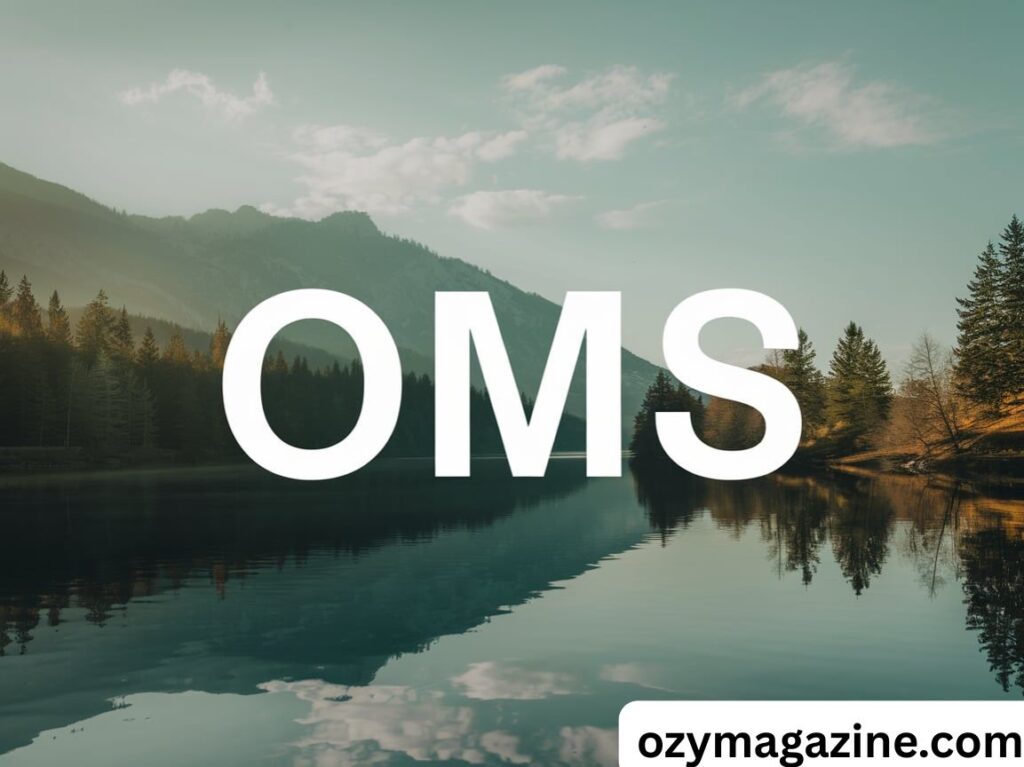OMS meaning in text is a short way to say “Oh My Stars.” People use it to show surprise or excitement when texting. It is like saying “Wow” or “Oh my gosh” but softer.
If you see OMS in a message, you might wonder what it means. Many people get confused by it. Learning this slang will help you understand texts better and join the conversation.
This phrase is popular in casual chats and social media. It is mostly used by young people in the USA. Knowing OMS meaning in text helps you keep up with online trends and talk naturally with friends.
Definition & Meaning
OMS meaning in text is most often understood as “Oh My Stars”, though in different contexts it might carry other interpretations. When someone types OMS in a message, they usually express surprise, astonishment, admiration, or a kind of mild exclamation. This phrase echoes older exclamations like “Oh my gosh” or “Oh my goodness,” but with a distinct, often more playful or stylistic twist.
Other meanings arise depending on context. OMS might sometimes be shorthand for names of organizations, medical terms, or even personal initials. In texting or chatting among friends, however, the most common meaning aligns with exclamations of surprise or delight.
Background & History
The practice of using short abbreviations in written digital communication has roots in the early days of SMS (Short Message Service), when character limits encouraged shortcuts. OMS seems to be a more recent entry into that world of shorthand. Its popularity has grown alongside social media platforms, where faster typing and catchy expressions are valued.
Slang expressions like “OMG” (Oh My God), “OMW” (On My Way), and “OML” (Oh My Lord) have existed for decades and served as precursors to OMS. OMS appears to combine that pattern but aims for something a little softer or less intense. Because “God” or “Lord” may carry religious or serious connotations for some people, “Stars” or similar exclamatory words provide a lighter alternative. In this way, OMS joins a tradition of milder, expressive interjections in text.
Usage in Various Contexts

Texting friends late at night, posting on social media, commenting under a video, or reacting in group chats—OMS pops up in many different places. When someone sees a surprising photo or hears shocking news, they might type “OMS” to show they are taken aback or impressed. In a fun conversation, OMS might appear after someone delivers gossip, reveals big news, or shares something cute or hilarious.
In more formal or professional settings, OMS is less common because it feels casual. It often appears in casual direct messages, on platforms like Instagram, Snapchat, TikTok, or among people who share memes, jokes, or pop culture references.
Occasionally, OMS could be used ironically or sarcastically. For example, someone might say “OMS, I totally forgot about the deadline,” meaning “Oh my stars, I messed up.” Tone matters in text, but because tone is hard to read, the receiver may rely on context, previous conversation style, or emojis to interpret whether it is serious or playful.
Common Misconceptions & Clarifications
Many people think OMS means “Oh My Soul,” “Oh My Sun,” or even “Oh My Side.” Some assume OMS is a typo for OMG. These misconceptions happen because the pattern (“Oh My _”) is well known, and people often guess based on what feels familiar.
Clarification depends on asking the sender or checking surrounding messages. If someone often uses playful or mild exclamations, OMS likely means something light. If ambiguities remain, the safest interpretation is that the sender meant “Oh My Stars” unless something in context suggests a different meaning.
Some may believe that OMS is an offensive or profane acronym. In most cases, OMS is not offensive. It lacks swear words and is generally seen as polite. Only in rare cases where OMS is used as a custom initialism (for example someone’s name, organization, or private code) might its meaning depart completely from this standard exclamation.
Similar Terms & Alternatives
There are many abbreviations in texting that look or feel like OMS. Some express surprise, while others express emphasis or admiration. Words or phrases that share this space include OMG, OMW, OML, “Oh my word,” and “Oh my stars and garters.” Each alternative has its own tone.
| Term | Meaning | Tone Compared to OMS |
| OMG (“Oh My God”) | Strong, emphatic surprise, sometimes serious | More intense than OMS |
| OML (“Oh My Lord / Life”) | Very dramatic or dramatic exaggeration | More intense, possibly religious or emotional |
| “Oh my word” | Mild surprise or disbelief | Similar to OMS but more old‐fashioned |
| “Oh my stars” (fully spelled) | Gentle exclamation of surprise or admiration | Equivalent to OMS, just longer form |
| “Whoa” or “Yikes” | Reaction to something shocking, scary, or big | Less specific, more broadly reactive |
Alternatives to OMS might be preferred if someone desires a softer expression, or more formal speech, or wants to avoid religious phrases.
How to Respond to This Term
When someone sends OMS in a text, your response depends on what was said just before and your relationship with that person. If they used OMS after sharing something exciting, you might respond with words that match the enthusiasm. If they are surprised, you can confirm or express shared surprise.
One way to respond is by acknowledging their reaction: “I know, right?” or “Crazy, isn’t it?” Another approach is to ask for more details: “What happened?” or “Tell me more!” If the conversation is playful, you may respond with a similar mild exclamation: “OMG that’s wild!” or “Haha, oh wow.”
If the OMS was used in error, or you are unsure what they meant, a short clarification request is okay: “Just to check, did you mean Oh My Stars by OMS?” or “Could you remind me what OMS means here?” This ensures you understand, and shows interest in their style.
Regional or Cultural Differences
In the USA, OMS is relatively new and mostly present among younger generations, especially teens and young adults familiar with social media culture. In other countries or regions, OMS may be unheard of, or it might mean something completely different—perhaps the initials of an organization, a place name, or even medical terms (like OMS for Oral and Maxillofacial Surgery).
Cultural norms about exclamations vary. Some cultures use stronger religious references casually, so “Oh My God” or its abbreviations are common. Others avoid religious or strong language in casual speech, which may make alternatives like OMS more appealing. In certain communities, using OMS might seem more polite, inclusive, or harmless compared to OMG or OML.
Regions where English is not the first language may misinterpret OMS or not recognize it at all. Exposure through media, internet, films, or TV shows can introduce the term into informal speech. Over time, regional slang evolves, and OMS could become more mainstream outside the USA or take on regionally specific connotations.
Comparison with Similar Terms

Comparing OMS meaning in text with similar terms deepens understanding of its uniqueness. OMS shares pattern and purpose with many “Oh My ___” structures. When compared with OMG, OMG often feels stronger and sometimes carries religious or serious overtones. OMS is softer, possibly more refined.
In comparison with OML (Oh My Lord / Life), OMS is less dramatic. “Lord” has religious weight or seriousness; “Stars” offers poetic or whimsical imagery without strong connotations. In contrast with “Oh my word,” OMS is shorter and trendier. While “Oh my word” may sound old‐fashioned, OMS feels very modern and casual.
When compared with non‐“Oh My” terms like “Whoa,” “My goodness,” or “Geez,” OMS sits somewhere between mild surprise and expressive admiration. It is more elaborate than “Whoa” but less formal than “My goodness.” Each term reacts to stimuli differently, and choosing one over the other changes tone.
Read Also : 300+ Monday Blessings, Quotes, Wishes, and Images
Usage in Online Communities & Dating Apps
In online forums, chat rooms, or on platforms like Instagram, TikTok, Twitter, use of OMS often appears as almost reaction shorthand. People see a photo, meme, or confession and write OMS to express delight, surprise, or to emphasize something. Influencers, content creators, and meme sharers sometimes use OMS as a caption or comment for lighter, funny, or cute content.
In dating apps, OMS meaning in text reappears but takes on weight depending on tone. If someone says “OMS, your photos are stunning,” the intent is praise. If they say “OMS, you said you like hiking?, I love that too,” the exclamation adds warmth. In these contexts, using OMS can make communication feel relaxed, friendly, casual. It signals openness and informal familiarity. It may help build rapport more quickly than dry, formal messages.
Case study: A person named Alex matched with Jamie on a dating app. Jamie sees Alex’s hiking pictures and writes “OMS, those trails look epic!” Alex responds with similar casual tone, adding emojis. The OMS broke ice, reduced perceived distance. Without it, message would have felt more formal and less inviting. This illustrates how OMS meaning in text can help build connection in casual digital relationships.
Hidden or Offensive Meanings
Most of the time OMS carries no negative or hidden meaning. It is not a slur, insult, or profanity. Exceptions arise when OMS is used as initials for something else, in private jokes, or with ironic intent. If someone uses OMS sarcastically, it might imply mock surprise or shade. Context is key.
Occasionally, people mishear or misread abbreviations. Someone might believe OMS hides a stronger meaning or implies something offensive. Usually this is misunderstanding. If OMS is used repeatedly in uncomfortable contexts (e.g. insulting or mocking), then the meaning may shift in that relationship. Generally, OMS remains safe.
Suitability for Professional Communication
In a professional email, business chat, or formal report, OMS meaning in text is rarely suitable. Such settings usually require clarity, formality, and minimal slang. Experienced professionals often avoid digital slang unless the company culture is casual and accepts conversational tone.
In internal team chat, OMS might be tolerated among close coworkers in informal channels (like Slack or casual group messaging). But in client communication, official documents, or formal correspondence, it is safer to avoid OMS. One should substitute OMS with full expressions: “I’m surprised”, “That’s amazing”, “Wow”, or avoid exclamatory slang altogether.
OMS Meaning in Chat from a Girl
When a girl uses “OMS” in chat, it usually stands for “Oh My Stars”, a light, playful expression of surprise, joy, or admiration. It’s similar to “OMG” but sounds cuter and softer, which is why it’s often used in flirty, casual, or excited messages.
For example, if you send a funny meme or a compliment, she might reply “OMS 😂” to show she’s surprised or touched. It’s not romantic on its own, but the tone can feel warm and sweet depending on the message.
OMS Meaning Slang Tagalog
In Tagalog or Filipino slang, OMS doesn’t have a widely recognized meaning like in English chats. However, it may be misread or jokingly interpreted as “Oh My Sarap” (meaning “Oh My Delicious”), depending on the context and humor of the conversation.
That said, OMS is not a standard Tagalog slang term. Most Filipinos using it are likely just following the American/English meaning of “Oh My Stars,” especially in online conversations or while watching U.S.-based content.
What Does OMS Mean on TikTok

On TikTok, OMS is mostly used in captions or comments as a trendy way to say “Oh My Stars.” It’s often found in reactions to cute videos, shocking stories, or surprising transformations. The abbreviation gives a friendly, expressive vibe.
TikTok users love quick and catchy slang, and OMS fits right in. It helps show emotion without sounding too dramatic, making it perfect for funny, relatable, or emotional content.
SB Meaning in Text
In text messages, SB usually stands for “Snap Back”, especially on Snapchat. It’s a way of asking someone to reply with a photo or video snap. Teens and young adults use it often when trying to keep a Snapstreak going.
However, SB can also mean “Somebody” depending on the context. For example, “SB told me you liked me” just means “somebody.” Always read the whole message to figure out what version fits best.
FAQ,s
What does OMS mean in texting?
OMS stands for “Oh My Stars”, a playful way to express surprise or amazement in a lighthearted tone.
What does OSM stand for in texting?
OSM usually means “Awesome”, used to show approval, excitement, or appreciation for something.
What does OMS stand for?
In casual texting, OMS stands for “Oh My Stars”, but in other contexts, it can refer to organizations or medical terms.
What does slang mean in text?
Slang in text refers to informal words or abbreviations used to make communication faster, trendier, or more expressive.
Conclusion
Understanding what OMS means in text gives you insight into modern digital communication. This abbreviation often stands for Oh My Stars and appears in casual conversation, social media, and dating apps. It conveys surprise, delight or friendly shock without harshness. While there are misconceptions, context usually clarifies meaning.
OMS is similar to other exclamatory slang but softer than words like OMG or OML. For professional settings, OMS is seldom appropriate, but among friends and informal digital spaces it helps convey warmth and playfulness. Next time you see OMS in a message, you will likely understand it and even choose to use it yourself.










